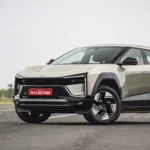The UK is experiencing a major shift towards cleaner, greener transport. As sales of electric vehicles (EVs) continue to grow, the demand for electric car chargers across the UK has never been higher. Whether you’re a new EV owner or considering the switch, understanding your charging options is essential to make your driving experience smooth and stress-free.
The Rise of Electric Cars in the UK
In 2024, more than 20% of new car sales in the UK were electric. With the government’s plan to ban the sale of new petrol and diesel cars by 2035, this trend will only accelerate. But with EV ownership comes a crucial question: How and where do you charge your electric car?
Types of Electric Car Chargers in the UK
EV chargers come in different types, depending on speed, location, and power output. Here’s a breakdown:
1. Slow Chargers (3 kW)
-
Ideal for overnight charging at home.
-
A full charge typically takes 6–12 hours.
-
Can be plugged into a standard 3-pin socket, though dedicated wall chargers are safer and faster.
2. Fast Chargers (7–22 kW)
-
The most common type for home and public use.
-
A 7 kW home charger can fully charge most EVs in 6–8 hours.
-
22 kW fast chargers are typically found in workplaces or public areas and need a three-phase power supply.
3. Rapid and Ultra-Rapid Chargers (43–350 kW)
-
Found at motorway services and major public charging hubs.
-
Can charge an EV to 80% in 20–40 minutes.
-
Use CHAdeMO or CCS connectors depending on your car model.
Charging at Home
For many EV drivers in the UK, home charging is the most convenient option. Installing a home wallbox charger allows you to charge your vehicle overnight, often at cheaper off-peak electricity rates.
Benefits of Home Charging:
-
Cost-effective compared to public charging.
-
Safe, weatherproof installation.
-
Takes advantage of government grants like the EV Chargepoint Grant (for renters or flat owners).
Installation Cost: £800–£1,200 depending on the charger and location. Some energy companies and EV manufacturers offer discounts or free installation with a new vehicle.
Public Charging Network in the UK
As of 2025, there are over 60,000 public charging connectors across the UK, and the network is expanding rapidly. Leading providers include:
-
Pod Point
-
bp pulse
-
Instavolt
-
Osprey
-
Gridserve
-
Tesla Supercharger Network (available to non-Tesla drivers at select locations)
You can find nearby chargers using apps like Zap-Map, PlugShare, or Google Maps, which show real-time availability, pricing, and connector types.
Public Charging Costs
Public charging can be:
-
Free at some supermarkets, hotels, and shopping centres.
-
Pay-as-you-go (typically 40–70p/kWh for rapid charging).
-
Subscription-based, which can reduce costs if you charge frequently.
Workplace Charging
More UK businesses are now installing EV chargers as part of their sustainability and employee benefit programs. Government grants like the Workplace Charging Scheme (WCS) help offset installation costs, making it easier for companies to support EV adoption.
Benefits for Employers:
-
Attract eco-conscious employees.
-
Reduce carbon footprint.
-
Meet corporate social responsibility (CSR) targets.
Government Support and Grants
To encourage EV adoption, the UK government offers various incentives:
-
EV Chargepoint Grant: Up to £350 off home charger installation for renters and flat owners.
-
Workplace Charging Scheme: Up to £350 per socket, with a maximum of 40 sockets per business.
-
Zero Road Tax: Until 2025 for pure EVs.
-
Clean Air Zones: EVs are often exempt from charges in areas like London, Birmingham, and Bath.
Future of EV Charging in the UK
The UK is investing heavily in EV infrastructure. By 2030, the government aims to have over 300,000 public chargers nationwide. This includes high-speed charging hubs along motorways and rural coverage to prevent “charging blackspots.”
There’s also a growing push toward smart charging—allowing EVs to charge when demand is low and energy is cheapest. Some providers even offer vehicle-to-grid (V2G) technology, enabling cars to feed electricity back into the grid.
Final Thoughts
As the UK transitions to a greener future, access to reliable and efficient electric car chargers is key. Whether you’re charging at home, at work, or on the go, the infrastructure is improving every day. Investing in an EV is not only environmentally responsible but also increasingly practical.
So if you’re searching for “electric car chargers in the UK,” now is the perfect time to explore your options, apply for available grants, and take your first step toward sustainable driving.
- Electric Car Chargers in the UK – A Complete Guide for EV Owners
- As the UK transitions to a greener future, access to reliable and efficient electric car chargers is key. Whether you're charging at home, at work, or on the go, the infrastructure is improving every day.
- Car Chargers in the UK ,
Related posts:
 Mahindra BE 6e: Revolutionizing Electric SUVs in India
Mahindra BE 6e: Revolutionizing Electric SUVs in India
 Global EV Taxi Market Set to Reach $80.4B by 2033: Key Trends
Global EV Taxi Market Set to Reach $80.4B by 2033: Key Trends
 Elegant Wedding Limo Service in Hopewell, NJ for Your Big Day
Elegant Wedding Limo Service in Hopewell, NJ for Your Big Day
 Top Electric Vehicle Companies Dominating the Market in 2025
Top Electric Vehicle Companies Dominating the Market in 2025
 Avoid Costly Mistakes: Choose the Right AC Installation Service
Avoid Costly Mistakes: Choose the Right AC Installation Service
 Why Regular E-Bike Repair Is the Secret to a Longer-Lasting Ride?
Why Regular E-Bike Repair Is the Secret to a Longer-Lasting Ride?
 Top Equipment Trailers Features to Look for in the UAE’s Harsh Climate
Top Equipment Trailers Features to Look for in the UAE’s Harsh Climate
 How to Choose the Right Plumbing Services in Ludlow: A Complete Guide
How to Choose the Right Plumbing Services in Ludlow: A Complete Guide







